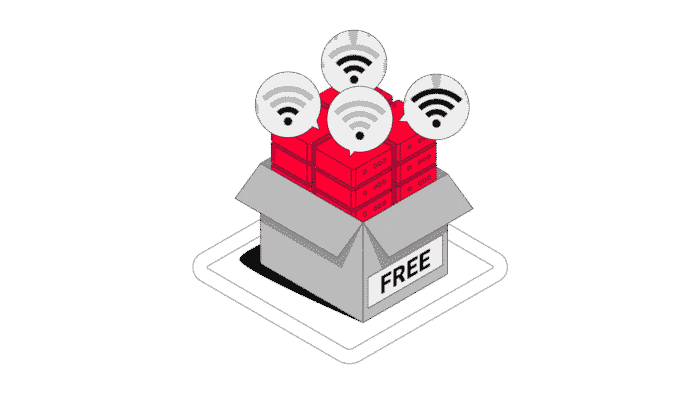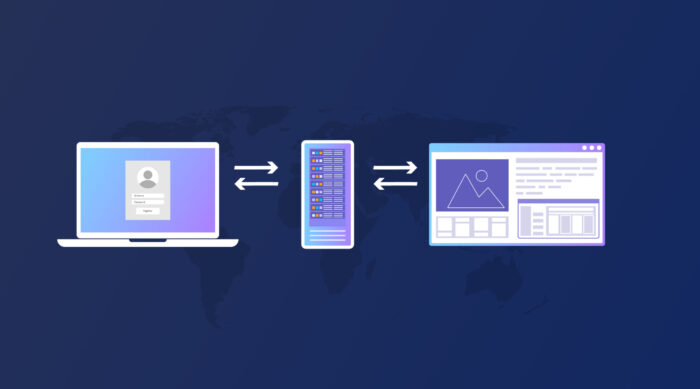Your network connection to the outside world will typically involve intermediaries. At the basic level, your internet service provider (ISP) is the main intermediary responsible for facilitating the connection to web servers. (Your ISP can see what websites you visit.)
Also, using a proxy server introduces another intermediary on top of your ISP. The same goes for a tool like a virtual private network (VPN).
Such intermediaries can see what websites you visit and, if unscrupulous, can keep logs of this data. This article, therefore, looks at how various tools in the free proxy list handle user data and the logging risks associated with using them.
Logging risks of free proxies
Free proxies, like other types of proxies, are intermediaries through which web traffic (web requests and server responses) is routed. Because of this arrangement, your proxy server provider gets to see some of the data that constitutes the traffic. For instance, they can see the websites you want to visit.
But given that the requests and responses are sent through the Hypertext Transfer Protocol Secure (HTTPS), which encrypts the data, it’s nearly impossible for the providers to see exactly what is being sent. However, there are some circumstances that can turn this impossibility into a possibility.
For instance, some providers can, by conducting man-in-the-middle attacks, install spyware that logs all activity. They can also abuse root certificates, which can spiral out of control if they have the private key.
Additionally, providers that only supply HTTP proxies can see all the data sent using this unsecured protocol. This data may contain sensitive information.
Why untrusted providers log data?
Untrusted proxy providers keep a log of the websites you visit as well as all the data sent using HTTP. And these actions are backed by their love for secrecy.
These providers rarely disclose what data they collect and how they use it, unlike trusted proxy providers. This failure to disclose absolves them of any commitment to data privacy and security; it supports their actions of logging traffic.
The disregard for data privacy and security makes free proxies, especially those supplied by untrusted providers, unideal for important activities like scraping crucial data from websites.
Other factors like instability (due to frequent downtime when the bandwidth is exceeded) and unreliability (because free proxies assign IP addresses that were blacklisted, meaning they cannot access some websites) further support the fact that free proxies should not be used for web scraping.
Instead, users should use free proxies, including those provided by reputable, trusted providers, for testing web performance across different regions and small-scale tasks. And in the event that you want to use a free proxy, the section below details the three factors to look for.
How to choose a free proxy for your scraping needs?
There are several aspects to look for when choosing a tool from the free proxy list for web scraping and other activities. These include:
- Logging policy: Trusted providers will disclose what user data they collect and how they use it. For instance, Oxylabs’ Code of Ethics notes that the company only collects personal data required to provide services and maintain relationships. It further states that the data is not only processed securely and transparently but is also protected against theft, modification, or unauthorized access. Against this backdrop, the proxies you choose from the free proxy list should only include those that clearly outline their logging policies.
- Commitment to adhering to data privacy regulations: Closely related to the logging policies is adherence to relevant data privacy and security laws. National, state, and regional laws, like the EU’s General Data Protection Regulation (GDPR), the United States’ California Consumer Privacy Act, Germany’s Telemedia Act, and more, outline how companies and service providers should handle consumer data. Trusted free proxy providers will clearly express their commitment to such laws. You should, therefore, avoid providers that do not expressly state that they adhere to these laws and regulations.
- Provider’s reputation: Trusted providers have a solid reputation, with their customers providing positive reviews. In this regard, populating your go-to free proxy list with solutions from reputable providers is a no-brainer. Such providers will naturally be sticklers for the law. As a result, they will not collect data, monitor your traffic, or conduct nefarious activities like committing man-in-the-middle (MitM) attacks. This makes them the perfect tools for scraping data. But you should, of course, bear in mind that free proxies are only ideal for a few tasks. These include small-scale web scraping and testing web performance across different regions.
Conclusion
Untrusted providers rarely disclose their policies and commitment to data privacy regulations, if at all. This creates a logging risk. These providers collect data such as the websites you have visited, sensitive information sent using unencrypted protocols, and request data.
In this regard, free proxies from such providers are not ideal for scraping data. If you still want to use these tools, ensure the free proxy list includes solutions from a trusted company. Also, you should limit its usage to tests and small-scale activities.


